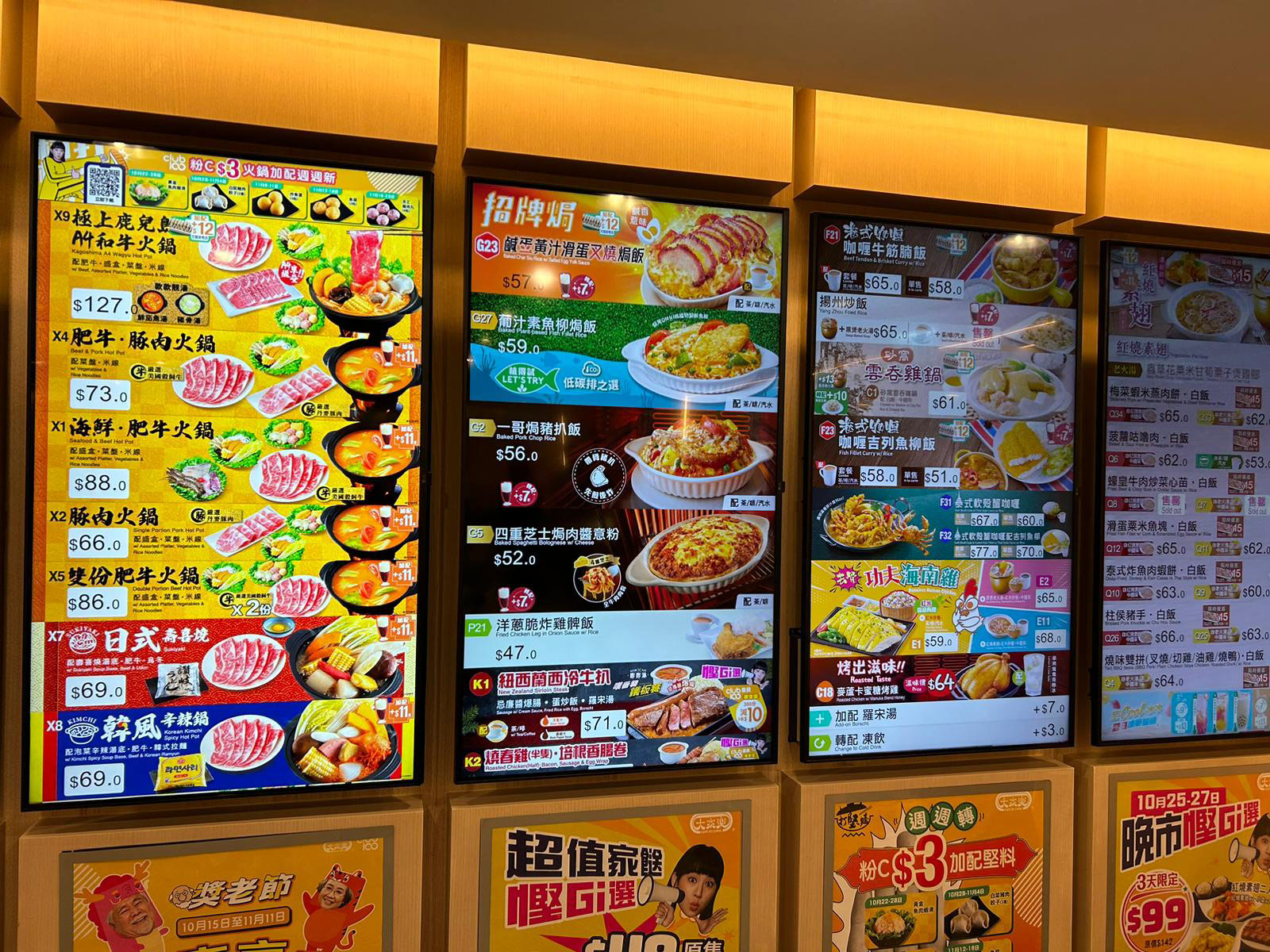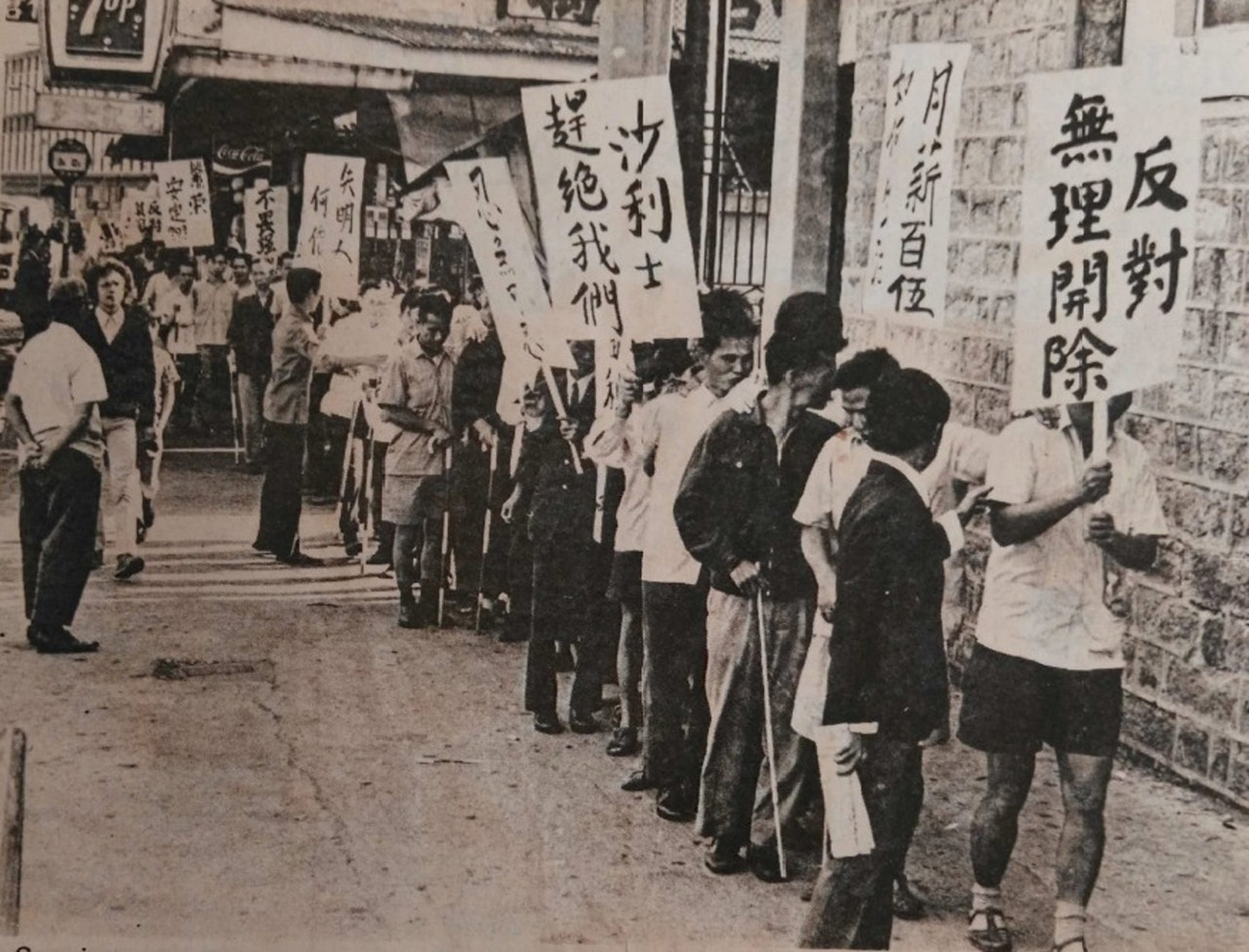Living with a “Glass Tummy” in a Food Paradise: The Everyday Experience of Managing Irritable Bowel Syndrome in Hong Kong
Darren Tsz-Hin Fung
CATEGORY
What is the experience of living with the chronic condition of irritable bowel syndrome (IBS) in a society that celebrates culinary indulgence?
Moments ago, my friend and I had just stepped out of a restaurant in the SoHo area in Central, Hong Kong. A stomachache that felt all too familiar emerged. Then, it quickly worsened. Where could I find a clean bathroom close by? It would probably take me ten minutes to get to a hotel or mall nearby. PMQ came to mind. This heritage building that has been turned into a mixed-use space for art studios and mom-and-pop stores was only three blocks away. “I need to use the bathroom. I’ll call you when I’m done,” I frantically told my friend. After zipping through streams of pedestrians, I arrived on the floor in PMQ where the bathrooms were located. Even though I regard myself as an able-bodied person, I dashed into the bathroom for the disabled as it was, I suppose, used by fewer people. It turned out to be clean, spacious, and free of an unpleasant odor, giving me a modicum of peace of mind.
After meeting up with my friend again, we tried to identify the culprit causing my diarrhea. Was it the abundant olive oil poured over the pizza that had already raised a red flag in my mind during the meal? Was it the cream in the tomato soup that made it so thick and smooth? I was frustrated, as I had already ordered the food items on the menu that seemed least likely to cause diarrhea. Despite the tastiness of the food—especially the thin-crust pizza with slightly burned, crispy edges—the restaurant is now on my blacklist of eateries to be avoided.
This kind of small, episodic drama characterizes my everyday life in coping with the chronic condition of irritable bowel syndrome (IBS), which is commonly known as bo1 lei1 tou5 (玻璃肚) in Hong Kong. Literally meaning “glass tummy,” this slang vividly describes the fragility of the gut of a person with IBS. My gut started to become extremely sensitive during a phase in my life when I was swamped with work, graduate school applications, and community engagements. At that time, I had diarrhea a few times a week, always right after a meal. Now, my IBS symptoms fluctuate, worsening during stressful times, and becoming less severe when life slows down.
My goal here is to shed light on the specificity of living with IBS in the city of Hong Kong. I will describe some general characteristics of the city’s food culture. Eating out and trying out different restaurants is the norm across social classes. Sharing the same dishes with everyone sitting at the same table is another culinary custom. It is against this context that I have to negotiate food selections, the willingness of people to accommodate my dietary restrictions, and bathroom access in order to go about my everyday life smoothly and participate in social life successfully. These experiences will be analyzed through the lens of misfitting in disability studies. I argue that IBS and my practices of managing it have rendered me a misfit in a society where sharing dishes and culinary indulgence is the norm. Yet, the city’s consumer culture, of which culinary indulgence is very much a part, not only leads to situations of misfitting for me, but also enables me to easily access the facilities required to manage such misfittings.
Eating out is one of the defining features of Hong Kong’s consumer culture. Not only has Hong Kong been promoted as a “food paradise” to attract tourists, many local people also regard eating out as one of Hong Kongers’ favorite activities. As the anthropologist Tan Chee-Beng observes, in a city “where most people live in small apartments, it is not a common practice to invite friends to have dinner at home. Even extended family members usually meet at a restaurant to eat together.” [1] Given the size of most people’s apartments, the long working hours, and the easy access to different kinds of affordable restaurants, it is common for people to eat out, whether on a weekday or over the weekend.
A key factor that makes eating out one of the most popular forms of leisure in the city is the easy access to a variety of restaurants. One can enjoy a wide range of cuisines not only in major shopping districts such as Mong Kok and Tsim Sha Tsui, but also in the malls attached to an ordinary public or private housing complex. In these malls, one can find restaurants serving Japanese, Italian and Thai food, as well as a variety of Chinese eateries. Even within a single restaurant, one can find global cuisines. For example, on a given day, the lunch menu of a branch of Fairwood—a fast food chain with more than a hundred branches across the city—would contain items ranging from laksa, to teriyaki beef bowl, to spaghetti bolognese, to beef curry, to the Cantonese dish claypot rice. People across the class spectrum can regularly choose from many kinds of restaurants and cuisines within walking distance from their homes and workplaces, promotes a culture of culinary indulgence.

The dinner menu of a popular fast food chain on a weekday includes hotpot, spaghetti bolognese, New Zealand sirloin steak, curry beef rice, sweet and sour pork, and Hainanese chicken rice (a Singaporean dish), among other items. Image courtesy of the author.
Another characteristic of the food culture of Hong Kong relevant to my IBS concerns is the practice of eating together. In many kinds of restaurants, dishes are expected to be shared among everyone at the table. This assumption is reflected in the customs of serving food in, say, a typical Cantonese restaurant. In Cantonese restaurants, the standard portion of a dish caters for a few people, and dishes are placed in the middle of the table. Diners use cutlery to pick up food from the dishes in the middle of the table before putting it into their own bowl or plate. Except for fast food eateries, this dining custom is extremely common, and can be observed in restaurants serving different kinds of Chinese cuisines, as well as in most Italian, Southeast Asian, South Asian, and sushi restaurants in the city.
As we will see in the next section, these aspects of food culture in Hong Kong shape the way I manage IBS.
To avoid diarrhea, I often have to exercise caution when selecting food. Like many working people in the city, for the sake of efficiency, I buy takeaway or eat out on weekdays. However, in contrast to many Hong Kongers’ penchant to try out different restaurants, my dietary restrictions have greatly limited the restaurants I visit and what I pick from a given menu. I refrain to the best of my ability from eating greasy foods, such as curry, stir-fried and pan-fried dishes, food served with abundant sauces, and noodles served in an oily broth. As such, when I buy takeaway or eat out on weekdays, what I choose to eat often revolves around only a handful of dishes offered at a handful of restaurant chains, foregoing many of the pleasures most Hong Kongers have taken for granted. Noodles in a clear broth with assorted self-picked ingredients at the chain restaurant Tam Jai Sam Gor, scrambled eggs with shrimps at Fairwood, and sushi made of cooked or seared ingredients at the multinational Sushiro can never go wrong. Picking the right food also entails trial and error. While the fries at one fast food chain are safe for my stomach, the much greasier fries at another are not.
Eating out and trying different kinds of food is one of the most popular social activities in Hong Kong. However, I have to regularly negotiate my dietary restrictions with other people’s desire to enjoy a variety of cuisines. Eating out with friends can be an anxiety-ridden activity. If someone suggests going to a restaurant I have never been to for a special occasion, I will search the restaurant online in advance, and browse the photos of the food and menu posted by previous customers to check if there are items that seem suitable for my stomach.
Given that social relationships are built around eating together, and that the custom of eating together in Hong Kong involves sharing the same dishes, my dietary restrictions sometimes undermine my sense of belonging to a social group. When I dine out with friends, I order food that seems safe for my stomach for myself, instead of sharing dishes with everyone at the table. On a few occasions, my friends have told me that they did not invite me to attend a dinner gathering, as they thought that the food at the Turkish eatery or the Sichuan hot pot place—where the raw ingredients are cooked inside a pot of spicy broth placed in the middle of the dining table—was too greasy for me. On some other occasions, I feel grateful that my friends—especially those I do not meet up with often but remember my gut problem—have proactively taken my dietary needs into account when selecting a restaurant or have chosen to defer to my choice of a place.
The stakes of not eating the same dishes consumed by one’s colleagues or work partners could be high. As an anthropology student, I have to conduct fieldwork by hanging out with members of a community whom I have never met. Since the success of research activities hinges on the rapport developed between the anthropologist and members of a community, anthropologists are expected to conform to community customs, and neophyte anthropologists are especially wary about doing anything that might be regarded as disrespectful or contrary to community norms. When I was conceiving my research project on the queer community in Taiwan, I had worried that if I refused to eat what my interlocutors ate when hanging out with them, they would see me as picky or disrespectful—or what is termed “not giving face” in Chinese—and thus exclude me from subsequent meal gatherings. As my research project eventually switched to working with people with visual impairments in Hong Kong, my worry waned. I thought that perhaps my interlocutors would not feel that I am not giving face even if I do not share food with them, as they would understand the importance of accommodating the needs of diverse bodies. This indeed has been the case.
To manage IBS, besides carefully selecting what to eat, I have become familiar with the locations of clean bathrooms. When I eat out with friends, there are times when I venture into eating something slightly oilier than what I usually eat, or order food that turns out to be greasier than expected. Sometimes, I feel unwell afterwards. Due to the unpredictability of my bowel movement, I have a map in my mind of clean bathrooms in the districts that I frequent. Public bathrooms abound in Hong Kong, however their hygienic conditions vary. Therefore, I prefer to use the bathrooms in malls. Given that Hong Kong “is the world’s mall-densest place,” “[w]ith about one mall per square mile,” [2] it does not usually take me long to find a bathroom in a mall even after I have left a street-level restaurant.
There are certain commonalities between my experience of living with IBS in Hong Kong and the situations many people with disabilities frequently find themselves in. Misfitting is a common point. The disability studies scholar Rosemarie Garland-Thomson observes that misfitting occurs “when the environment does not sustain the shape and function of the body that enters it.” [3] Given that different spaces are built with different presumptions of the kinds of bodies occupying them, “misfitting [is] a contingent and fundamental fact of human embodiment.” [4] People with disabilities, of course, face situations of misfitting far more often than others. Yet, everyone can find their body or mind misfitting in certain situations. In the domain of food consumption in Hong Kong, the normative body is one that indulges in culinary delight, consuming anything from curry to burgers to stir-fried Cantonese dishes without ailments. A person with this kind of body often does not have to fret about how and what to order in a given dining situation. Such a body experiences fitting in with the culinary culture in Hong Kong, in that it conforms to the “requirements [of the environment] in a way so as not to stand out, make a scene, or disrupt through countering expectations.” [5] In contrast, my body that falls ill when eating many kinds of food consumed by the majority of Hong Kongers and my breach of the social norm of sharing dishes at the table, renders me a misfit in many dining situations.
The norm of culinary indulgence is very much rooted in the consumer culture of Hong Kong. Yet, this culture has not only given rise to many situations of misfitting for me. The ubiquity of malls—the mecca of Hong Kong’s consumer culture—also enables my access needs to be met, and thus partially redresses my experience of misfitting. Bathrooms in malls can be used for free. Malls are also the sites where I can find branches of restaurant chains that I am familiar with. Therefore, the ubiquity of malls enables me to readily order familiar dishes, alleviating my worry about another episode of diarrhea.
Access to bathrooms and suitable restaurants only goes so far in remediating my experience of misfitting. As my discussion on the fragility of social belonging and the violation of social expectations shows, access also involves interpersonal negotiation. Sometimes, I have to take a risk to go to an unfamiliar restaurant suggested by a friend. Sometimes, my friends are not able to enjoy the delicious foods they desire when they defer to my choice of a restaurant. There have also been times when different friends in a social group having varying dietary restrictions plan to eat out together. On such occasions, it takes time and effort for us to communicate our different needs and search online to find a suitable restaurant. Perhaps as important as logistics in redressing misfitting are social relationships where a person feels comfortable to express their access needs, where others are aware of the (in)accessibility of different situations for them, [6] and where others provide emotional support for them to “navigat[e] an inaccessible world.” [7] As the disability studies scholar Tanya Titchkosky posits, “[e]xploring the meanings of access is, fundamentally, the exploration of the meaning of our lives together – who is together with whom, how, where, when, and why?” [8]
This text has been commissioned and written uniquely for Urgent Pedagogies.
1.
Tan Chee-Beng, “Commensality and the Organization of Social Relations,” in Commensality: From Everyday Food to Feast, ed. Susanne Kerner, Cynthia Chou and Morten Warmind (Bloomsbury, 2015), 26.
2.
Stefan Al, “Introduction,” in Mall City: Hong Kong’s Dreamworlds of Consumption, ed. Stefan Al (University of Hawaii Press, 2016), 1.
3.
Rosemarie Garland-Thomson, “Misfits: A Feminist Materialist Disability Concept,” Hypatia 26, no. 3 (2011): 594.
4.
Ibid., 598.
5.
Ibid., 596.
6.
Mia Mingus, “Access Intimacy: The Missing Link,” Leaving Evidence, May 5, 2011, https://leavingevidence.wordpress.com/2011/05/05/access-intimacy-the-missing-link/; Mia Mingus, “Access Intimacy, Interdependence and Disability Justice,” Leaving Evidence, April 12, 2017, https://leavingevidence.wordpress.com/2017/04/12/access-intimacy-interdependence-and-disability-justice/.
7.
Mia Mingus, “Access Intimacy, Interdependence and Disability Justice,” Leaving Evidence, April 12, 2017, https://leavingevidence.wordpress.com/2017/04/12/access-intimacy-interdependence-and-disability-justice/.
8.
Tanya Titchkosky, The Question of Access: Disability, Space, Meaning (University of Toronto Press, 2011), 6.
is a PhD candidate in the Department of Anthropology at The Chinese University of Hong Kong. His research project examines the education, employment and mobility of people with visual impairments in Hong Kong. Darren’s research interests include embodiment, medical anthropology, disability, and Hong Kong studies.






